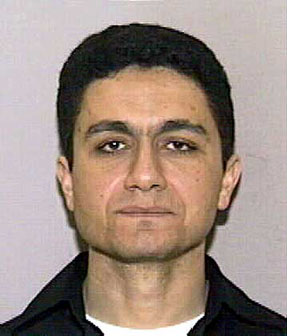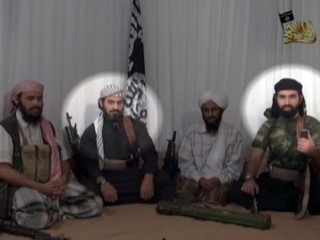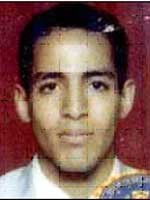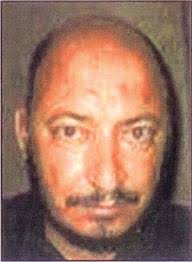Related Research Articles

The hijackers in the September 11 attacks were 19 men affiliated with Islamist jihadist organization al-Qaeda. They hailed from four countries; 15 of them were citizens of Saudi Arabia, two were from the United Arab Emirates, one was from Egypt, and one from Lebanon. To carry out the attacks, the hijackers were organized into four teams each led by a pilot-trained hijacker who would commandeer the flight with three or four "muscle hijackers" who were trained to help subdue the pilots, passengers, and crew. Each team was assigned to a different flight and given a unique target to crash their respective planes into. Mohamed Atta was the assigned ringleader over all 4 groups.

Ansar al-Islam in Kurdistan, simply called Ansar al-Islam, is a Kurdish Islamist militant and separatist group. It was established in northern Iraq around the Kurdistan Region by Kurdish Islamists who were former Taliban and former Al-Qaeda volunteers, which were coming back from Afghanistan in 2001 after the Fall of Kabul. Its motive is to establish an Islamic state around the Kurdistan region and to protect Kurdish people from other armed insurgent groups. It imposed strict Sharia in villages it controlled around Byara near the Iranian border.

Mohamed Salah al-Din al-Halim Zaidan commonly known by his nom de guerreSaif al-Adel is a former Egyptian Army officer and explosives expert who is widely understood to be the de facto leader of al-Qaeda. Al-Adel fought the Soviets as an Afghan Arab before becoming a founding member of the al-Qaeda organization. He is a member of Al-Qaeda's Majlis al-Shura and has headed the organization's military committee since the death of Muhammad Atef in 2001. He is currently known to live in Iran along with several other senior members of the group.

Mohamed Atiq Awayd Al Harbi is a citizen of Saudi Arabia formerly held in extrajudicial detention in the United States's Guantanamo Bay detention camps, in Cuba. His Guantanamo Internee Security Number was 333. The US Department of Defense reports that he was born on July 13, 1973, in Riyadh, Saudi Arabia.

Saleh Ali Saleh Nabhan was the leader of al-Qaeda in Somalia. He was listed on the FBI's third major "wanted" list, the FBI Seeking Information – War on Terrorism list, for his association with multiple attacks in Kenya in 2002, as well as his possible involvement in the 1998 United States embassy bombings, in which over 250 people lost their lives.

Abu Omar al-Baghdadi, born Hamid Dawud Mohamed Khalil al-Zawi was the Emir of the Islamic militant umbrella organization Mujahideen Shura Council (MSC), and its successor, the Islamic State of Iraq (ISI), which fought against the U.S.-led Coalition forces during the Iraqi insurgency.
During the 2001 Invasion of Afghanistan, many Taliban, al-Qaeda and militant fighters were captured and held at military bases in the region. On several occasions, there were instances of mass escapes.
Atiyah Abd al-Rahman, born Jamal Ibrahim Ashtiwi al Misrati, was reported by the US State Department to be a senior member of al-Qaeda and a member of the Libyan Islamic Fighting Group and Ansar al-Sunna. His name may be rendered in English as Atiyah Abdur-rahman or Atiyah Abdul-Rahman or in other ways. After his death he was described in Foreign Policy as a renaissance man for "combining both strategic and ideological savvy".

Fatah al-Islam is a Sunni Islamist militant group established in November 2006 in a Palestinian refugee camp, located in Lebanon. It has been described as a militant jihadist movement that draws inspiration from al-Qaeda. It became well known in 2007 after engaging in combat against the Lebanese Army in the Nahr al-Bared UNRWA Palestinian refugee camp. Following its defeat at Nahr el-Bared, the group relocated to the Ain al-Hilweh refugee camp near Sidon in 2008. As of 2014, after the death or capture of many members, most of the surviving members of Fatah al-Islam are thought to have joined other groups in Lebanon and Syria including the Free Syrian Army, Al-Nusra Front, Ahrar al-Sham, and the Islamic State of Iraq and the Levant.

Semiannually, the Office of the Director of National Intelligence (ODNI) publishes an unclassified "Summary of the Reengagement of Detainees Formerly Held at Guantanamo Bay, Cuba". According to ODNI's most recent Reengagement Report, since 2009, when current rules and processes governing transfer of detainees out of Guantanamo were put in place, ODNI assess that 5.1% of detainees – 10 men total, 2 of whom are deceased – are more likely than not to have reengaged in terrorist activities.
Since the Iranian Revolution in 1979, the government of the Islamic Republic of Iran has been accused by several countries of training, financing, and providing weapons and safe havens for non-state militant actors, such as Hezbollah in Lebanon, Hamas in Gaza, and other Palestinian groups such as the Islamic Jihad (IJ) and the Popular Front for the Liberation of Palestine (PFLP). These groups are designated terrorist groups by a number of countries and international bodies such as the EU, UN, and NATO; however, Iran considers such groups to be "national liberation movements" with a right to self-defense against Israeli military occupation. These proxies are used by Iran across the Middle East and Europe to foment instability, expand the scope of the Islamic Revolution, and carry out terrorist attacks against Western targets in the regions. Its special operations unit, the Quds Force, is known to provide arms, training, and financial support to militias and political movements across the Middle East, including Bahrain, Iraq, Lebanon, Palestine, Syria, and Yemen.
Omar bin Osama bin Mohammed bin 'Awad bin Laden, better known as Omar bin Laden, is a Saudi artist, author, cultural ambassador, and businessman, and fourth-eldest son of Osama bin Laden, with his first cousin and first wife Najwa Ghanhem. He lives in Normandy, France.
Events from the year 2007 in Algeria.
Periodically Saudi Arabia's Ministry of Interior publishes a most wanted list. According to Asharq Alawsat Saudi Arabia has published four lists of "most wanted" suspected terrorists, and those lists contained 19, 26, 36 and 85 individuals.
The Baraawe raid, code named Operation Celestial Balance, was a helicopter assault by United States Special Operations Forces against the al-Qaeda-linked terrorist Saleh Ali Saleh Nabhan and associated al-Shabaab militants near the town of Baraawe in southern Somalia.

Muhammad Jafar Jamal al-Kahtani is a citizen of Saudi Arabia who was a captive held in extrajudicial detention in the United States' Bagram Theater Internment Facility. He has been described as one of the four men responsible for an escape from Bagram, on July 11, 2005. According to Eric Schmitt and Tim Golden of the New York Times, US officials didn't first identify him and Omar al Farouq under their real names, when they first escaped.
Events in the year 2010 in Iraq.
The Akashat ambush was a well planned assault against an unarmed Syrian Army convoy defended by Iraqi soldiers that took place on 4 March 2013, as the group was travelling in the province of Anbar, next to the border with Syria. The Islamic State of Iraq claimed responsibility for the ambush on 11 March 2013.

Al-Qaeda in the Indian Subcontinent usually abbreviated as AQIS, is a branch of the Islamist militant organization Al-Qaeda which aims to fight the governments of Pakistan, Afghanistan, India, Myanmar and Bangladesh in order to establish an Islamic state and seeks to establish an Islamic caliphate in Indian Subcontinent.
Qatar has been accused of allowing terror financiers to operate within its borders, which has been one of the justifications for the Qatar diplomatic crisis that started in 2017 and ended in 2021. In 2014, David S. Cohen, then United States Under Secretary of the Treasury for Terrorism and Financial Intelligence, accused Qatari authorities of allowing financiers who were on international blacklists to live freely in the country: "There are U.S.- and UN-designated terrorist financiers in Qatar that have not been acted against under Qatari law." Accusations come from a wide variety of sources including intelligence reports, government officials, and journalists.
References
- ↑ "Obama's terrorist hit list grows". USA Today. 2011-09-30. Retrieved 2013-03-05.
- ↑ "Al-Qaeda's remaining leaders". BBC News. 2012-09-10. Retrieved 2013-03-05.